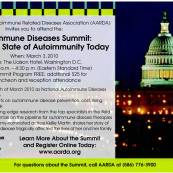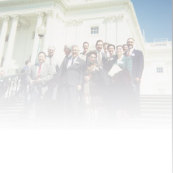WEBCAST ARCHIVE AVAILABLE HERE.
AUTOIMMUNE DISEASES SUMMIT: THE GLOBAL STATE OF AUTOIMMUNITY TODAY
Time: March 3, 2010 all day
Location: The Liaison Hotel
Street: 415 New Jersey Avenue, NW
City/Town: Washington D.C.
Website or Map: http://www.aarda.org
Phone: 586-776-3900
Event Type: conference
Organized By: American Autoimmune Related Diseases Association (AARDA)/ National Coalition of Autoimmune Patient Groups (NCAPG)
Mar. 3, 8:30 a.m., The Liason Hotel, 415 New Jersey Avenue NW
The American Autoimmune Related Diseases Association (AARDA) in collaboration with the National Coalition of Autoimmune Patient Groups (NCAPG) are hosting a national summit meeting on autoimmune diseases titled “Autoimmune Diseases Summit: The Global State of Autoimmunity Today.” The summit will include panel discussions on public policy, media, epidemiology and research surrounding the escalating problem of autoimmune diseases which affect some 50 million Americans today.
Participants:
Melissa Joan Hart (keynote speaker), actress; Donna Jackson Nakazawa (moderator), author of The Autoimmune Epidemic; Glinda Cooper, PhD, National Center for Environmental Assessment, Environmental Protection Agency (EPA); M. Eric Gershwin, MD, Chief, Division of Rheumatology, Allergy and Clinical Immunology, University of California at Davis; Christine Parks, Research Fellow, National Institute of Environmental Health Sciences (NIEHS); Frederick W. Miller, MD, PhD, Principal Investigator, Environmental Autoimmunity Group, NIEHS; Stanley M. Finger, PhD, Chairman of the Board, AARDA; Virginia T. Ladd, President and Executive Director, AARDA; Phyllis E. Greenberger, MSW, Society for Women’s Health Research; Betty Diamond, MD, Center Head, Department of Autoimmune Diseases, The Feinstein Institute for Medical Research, Chair of the Scientific Advisory Board, AARDA; Michael Amos, PhD, National Institutes of Standards and Technology (NIST); Rita Baron-Faust (moderator), MPH, CHES, author of The Autoimmune Connection; Margery Rosen, freelance writer; Peggy Peck, Vice President and Executive Editor, MedPage Today; Becca McDevitt, WJLA-TV, Washington, DC; Noel R. Rose, MD, PhD, Director of the Johns Hopkins Center for Autoimmune Disease Research, Chairman Emeritus of the Scientific Advisory Board, AARDA; Dr Robert Carter (moderator), Deputy Director, National Institute of Arthritis and Musculoskeletal and Skins Diseases (NIAMS); Daniel Rotrosen, MD, Director, Division of Allergy, Immunology, and Transplantation (DAIT), National Institute of Allergy and Infectious Diseases(NIAID); Dr. David Norris, Chair of the Department of Dermatology, University of Colorado Medical Center; Anthony Hayward, Division Director, National Center for Research Resources, NCRR; Katherine Morland Hammit, MA, Vice President of Research, Sjogren’s Syndrome Foundation; Cartier Esham, PhD, Director, Emerging Companies Health and Regulatory Affairs, Biotechnology Industry Organization (BIO)
Note: Register online. Summit Program FREE; additional $25 fee for luncheon and reception attendance.
Contact: Kristian Hurley at 586-776-3900 [email protected]
For further information: http://www.aarda.org


